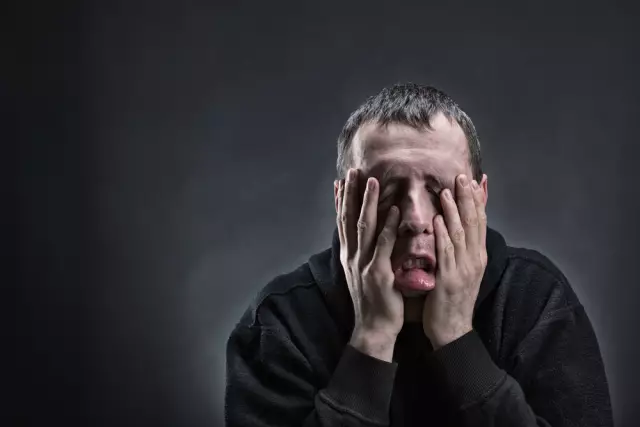- Author Rachel Wainwright wainwright@abchealthonline.com.
- Public 2023-12-15 07:39.
- Last modified 2025-11-02 20:14.
Delusional disorder
Delusional disorder is a type of mental illness, otherwise called paranoid disorder or psychosis, which is characterized by the presence of well-structured delusions.

The difference between delusional disorder and schizophrenia lies in the patient's firm belief in something false, but devoid of quirkiness and imagination. With this disorder, delusions of persecution, delusions of jealousy or unrequited love, dysmorphophobia, etc. can manifest themselves. Moreover, in reality, the situations experienced by the patient can be either untrue or exaggerated.
At the same time, people with delusional disorders are often socially active and adequate in areas other than delusional topics. However, in some cases, patients are so absorbed in their obsessions that their lives are ruined.
Diagnosis of delusional disorder
This mental illness is diagnosed based on the following symptoms:
- The absence of a psychotic disorder caused by the use of psychotropic drugs;
- Lack of persistent hallucinations;
- The presence of an eccentric delusional system, not characteristic of schizophrenia;
- Chasing a delusional idea for three or more months.
With delusional disorder, symptoms of depression may appear, but after affective manifestations of the disease, the nature of delusional ideas remains unchanged.
Expressed delirium is the most striking and only clinical characteristic of the disease and is, as a rule, of a personal rather than subcultural nature.
Causes of delusional disorder
The exact causes of delusional disorders, like many other mental illnesses, are unknown. However, experts identify three characteristic factors of human impact:
- Genetic factor. This is due to the fact that delusional disorder is most common in people whose relatives suffered from mental disorders. It is believed that a predisposition to the appearance of delusional disorder can be inherited from parents to children;
- Biological factor. Doctors often associate the formation of delusional symptoms with an imbalance in neurotransmitters in the brain - substances that help nerve cells to exchange impulses;
- Environmental factor. There is evidence that frequent stress, alcohol and drug abuse, and loneliness can act as a trigger for delusional disorder.
Organic delusional disorder
The main feature of organic delusional disorder is the specificity of psychosis, caused either by hereditary burden or by damage to the corresponding brain structures (transient or persistent). Organic delusional disorders can be divided into two groups: acute and chronic. Chronic conditions are characterized by a slow and, most often, irreversible course of the pathological process.

In the case of acute delusional disorders, psychopathological symptoms occur suddenly: as a rule, it is caused by a sharp dysfunction of the brain (traumatic brain injury, acute infectious disease, etc.). As a result of treatment, this disorder can either become reversible or take a progressive course.
Chronic delusional disorder
Chronic delusional disorders include a number of mental disorders that cannot be classified as schizophrenic, organic, and affective. The main clinical symptom of chronic delusional disorder is persistent delusion that lasts more than 3 months.
The forms of the course of chronic delusional disorders are different, and they are divided into 3 main types:
- Paranoid syndrome;
- Paranoid syndrome;
- Paraphrenic syndrome.
Paranoiac syndrome or paranoia is characterized by a strong delusional system without hallucinations. Paranoid delusions, as a rule, are well systematized and develop without internal contradictions. The development of delirium, of course, entails structural changes in the personality, but they do not carry signs of dementia, and therefore these people seem to others to be quite sane. Pathological "jealous", "prophets", "inventors", "people of high birth", etc. suffer from paranoia syndrome.
With paranoid syndrome, the patient's delirium also fits into a certain system, but it is less logical and more contradictory. In the development of this type of delusional disorder, an important role is played by unstable hallucinations - "voices" that comment on the behavior of the paranoid. With the further development of the disease, delirium can leave an imprint on a person's professional and personal life.
Paraphrenic syndrome or paraphrenia is characterized by the presence of a fantastic, clearly invented delirium. A certain place in the course of this disease have pseudo-hallucinations and false memories (confabulations) if they are not typically schizophrenic and constitute a small part of the patient's overall clinical picture.
Treatment of delusional disorders
Treatment of delusional disorders consists in the use of two complex methods: medication and psychotherapeutic.
The main goal of psychotherapy is to shift the patient's attention from the subject of his disorder to more constructive things. It is subdivided into individual, family and cognitive-behavioral psychotherapy, which helps the patient to recognize and change the train of thought that causes him anxiety.
Drug treatment of delusional disorders is associated with the use of antipsychotics - drugs used to treat mental disorders since the mid-50s of the last century. The essence of their action is to block dopamine receptors in the brain. The new generation of drugs used to treat delusional disorders are atypical antipsychotics that act on dopamine and serotonin receptors. If patients have depression, depression, anxiety, during therapy, psychotherapists may prescribe the use of tranquilizers and antidepressants.
Patients with severe delusional disorders are admitted to a medical facility until their condition returns to normal.
YouTube video related to the article:
The information is generalized and provided for informational purposes only. At the first sign of illness, see your doctor. Self-medication is hazardous to health!






